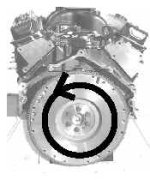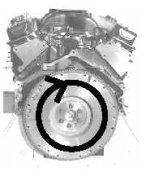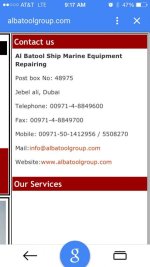waterlover
New member
Hello,
Long time lurker first time poster.
Let me preface this by admitting I'm not a mechanic by any stretch of the imagination.
Here's my problem. I'm in Dubai (from the States), and the lack of quality marine services here is unbelievable! The city is great, but this one area is waiting for the right company to come in and takeover.
I brought over a Carver 350 Mariner (1999) with 380 hours on twin Crusader 454 xli 7.4L engines.
Long story short, the starboard engine is running like a champ, but the port engine constantly overheats. After the first time it overheated, I kept it docked and tried to get it fixed (unsussesfully). After replacing the valves, risers manifolds, u cooler etc... it's still running hot and has as constant clicking sound.
After begging for a compression test from the first three mechanics who had no idea what I was talking about, the last mechanic came and did one unsolicited. 150 all around but 0 in the 5th cylinder.
The worker wanted to open the topside to see if (and here's where I show my ignorance) it was the rocker or something that could be fixed while the engine remained on the boat. The owner of the shop said the engine would have to be removed, but refused to do it because he feared running into a lack of parts situation. Let me explain. Apparently there are no trailers in the country capable of handling shaft drive boats (multiple mechanics story, not mine), so the solution would be to have it lifted at the local yard and the engine worked on there. The daily expenses are very expensive there and if we needed a part, the wait time could really add up.
So I was told to buy a new engine from the States and they would swap it out with the bad one. No more no less.
The other well known shop here came to look at the boat but had never heard of Crusaders and wouldn't touch them. They only work on Mercruisers.
So here's my dilemma, buy 2 Crusader engines from the States and have them swapped out, or put in 2 Mercs instead.
I chose Crusader because of the closed cooling and avoided the Mercs because the water's extremely salty here. The good thing about Mercruiser is they're well supported here.
Also, I'm thinking the Crusaders have 4 bolts for the engine mounts and the Mercs 2. Not sure how hard this would be to fit and the time it would take dockside.
So there's my extremely abbreviated story.
Thoughts from the experts?
Long time lurker first time poster.
Let me preface this by admitting I'm not a mechanic by any stretch of the imagination.
Here's my problem. I'm in Dubai (from the States), and the lack of quality marine services here is unbelievable! The city is great, but this one area is waiting for the right company to come in and takeover.
I brought over a Carver 350 Mariner (1999) with 380 hours on twin Crusader 454 xli 7.4L engines.
Long story short, the starboard engine is running like a champ, but the port engine constantly overheats. After the first time it overheated, I kept it docked and tried to get it fixed (unsussesfully). After replacing the valves, risers manifolds, u cooler etc... it's still running hot and has as constant clicking sound.
After begging for a compression test from the first three mechanics who had no idea what I was talking about, the last mechanic came and did one unsolicited. 150 all around but 0 in the 5th cylinder.
The worker wanted to open the topside to see if (and here's where I show my ignorance) it was the rocker or something that could be fixed while the engine remained on the boat. The owner of the shop said the engine would have to be removed, but refused to do it because he feared running into a lack of parts situation. Let me explain. Apparently there are no trailers in the country capable of handling shaft drive boats (multiple mechanics story, not mine), so the solution would be to have it lifted at the local yard and the engine worked on there. The daily expenses are very expensive there and if we needed a part, the wait time could really add up.
So I was told to buy a new engine from the States and they would swap it out with the bad one. No more no less.
The other well known shop here came to look at the boat but had never heard of Crusaders and wouldn't touch them. They only work on Mercruisers.
So here's my dilemma, buy 2 Crusader engines from the States and have them swapped out, or put in 2 Mercs instead.
I chose Crusader because of the closed cooling and avoided the Mercs because the water's extremely salty here. The good thing about Mercruiser is they're well supported here.
Also, I'm thinking the Crusaders have 4 bolts for the engine mounts and the Mercs 2. Not sure how hard this would be to fit and the time it would take dockside.
So there's my extremely abbreviated story.
Thoughts from the experts?




